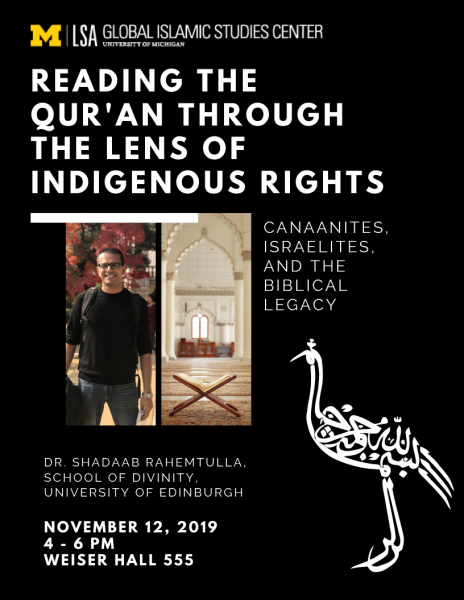GISC Event. Reading the Qur'an through the Lens of Indigenous Rights: Canaanites, Israelites, and the Biblical Legacy
Dr. Shadaab Rahemtulla, Lecturer in Islam and Christian-Muslim Relations at the University of Edinburgh
Dr. Shadaab Rahemtulla is Lecturer in Islam and Christian-Muslim Relations at the University of Edinburgh. A Canadian Muslim of Indian descent, Shadaab completed his doctorate in contemporary Islamic thought at the University of Oxford. He is the author of the book, Qur'an of the Oppressed: Liberation Theology and Gender Justice in Islam, published by Oxford University Press. As the title of his book suggests, Shadaab's primary interest lies in how religion can be (re)interpreted as a liberating force to confront contexts of marginalization, such as patriarchy, poverty, racism, and empire. Before joining the University of Edinburgh, he was Assistant Professor at the University of Jordan, where he taught for six years.
On November 12th at 4 PM in 555 Weiser Hall, join us for a presentation on reading the Qur'an through the lens of Indigenous rights: Canaanites, Israelites, and the Biblical legacy.
This event is free and open to the public.
If you are a person with a disability who requires an accommodation to attend this event, please contact us at islamicstudies@umich.edu, we'd be happy to help. As you may know, some accommodations may require more time for the university to arrange, so please let us know as soon as you can.
On November 12th at 4 PM in 555 Weiser Hall, join us for a presentation on reading the Qur'an through the lens of Indigenous rights: Canaanites, Israelites, and the Biblical legacy.
This event is free and open to the public.
If you are a person with a disability who requires an accommodation to attend this event, please contact us at islamicstudies@umich.edu, we'd be happy to help. As you may know, some accommodations may require more time for the university to arrange, so please let us know as soon as you can.
| Building: | Weiser Hall |
|---|---|
| Event Type: | Presentation |
| Tags: | Islamic Studies, Presentation |
| Source: | Happening @ Michigan from Global Islamic Studies Center, International Institute |
The Global Islamic Studies Center organizes a number of public events each year such as lectures, conferences, and films, many in collaboration with other U-M units. Please use our searchable events calendar for information about upcoming programs sponsored by GISC and the Interdisciplinary Islamic Studies Seminar (IISS).


